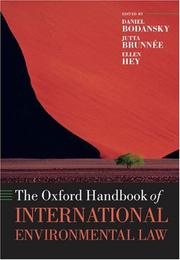| Listing 1 - 10 of 12 | << page >> |
Sort by
|
Book
ISBN: 9004444378 9004444386 9789004444379 Year: 2020 Publisher: [Leiden]: Brill Nijhoff,
Abstract | Keywords | Export | Availability | Bookmark
 Loading...
Loading...Choose an application
- Reference Manager
- EndNote
- RefWorks (Direct export to RefWorks)
The interplay between procedure and substance has not been a major point of contention for international environmental lawyers. Arguably, the topic?s low profile is due to the mostly uncontroversial nature of the field?s distinction between procedural and substantive obligations. Furthermore, the vast majority of environmental law scholars and practitioners have tended to welcome the procedural features of multilateral environmental agreements and their potential to promote regime evolution and effectiveness. However, recent developments have served to put the spotlight on certain aspects of the procedure substance topic. ICJ judgments revealed ambiguity on aspects of the customary law framework on transboundary harm prevention that the field had thought largely settled. In turn, in the treaty context, the Paris Agreement?s retreat from binding emissions targets and its decisive turn towards procedure reignited concerns in some quarters over the ?proceduralization? of international environmental law. The two developments invite a closer look at the respective roles of, and the relationship between, procedure and substance in this field and, more specifically, in the context of harm prevention under customary and treaty law.
Book
Year: 1988
Abstract | Keywords | Export | Availability | Bookmark
 Loading...
Loading...Choose an application
- Reference Manager
- EndNote
- RefWorks (Direct export to RefWorks)
Book
ISBN: 9780521880657 9780521706834 9780511781261 0521880653 0521706831 Year: 2010 Volume: 67 Publisher: Cambridge: Cambridge university press,
Abstract | Keywords | Export | Availability | Bookmark
 Loading...
Loading...Choose an application
- Reference Manager
- EndNote
- RefWorks (Direct export to RefWorks)
"It has never been more important to understand how international law enables and constrains international politics. By drawing together the legal theory of Lon Fuller and the insights of constructivist international relations scholars, this book articulates a pragmatic view of how international obligation is created and maintained. First, legal norms can only arise in the context of social norms based on shared understandings. Second, internal features of law, or 'criteria of legality', are crucial to law's ability to promote adherence, to inspire 'fidelity'. Third, legal norms are built, maintained or destroyed through a continuing practice of legality. Through case studies of the climate-change regime, the anti-torture norm, and the prohibition on the use of force, it is shown that these three elements produce a distinctive legal legitimacy and a sense of commitment among those to whom law is addressed"--
International law --- Obedience (Law) --- Rule of law --- Effectiveness and validity of law --- Social aspects --- Psychological aspects --- Effectiveness and validity of law. --- Rule of law. --- Psychological aspects. --- Social aspects. --- Law of nations --- Nations, Law of --- Public international law --- Law --- Validity and effectiveness of law --- Jurisprudence --- Supremacy of law --- Administrative law --- Constitutional law --- Legal obligation --- Obligation, Legal --- Obligation to obey the law --- Philosophy --- Obedience (Law). --- International law - Social aspects --- International law - Psychological aspects
Book
ISBN: 051185031X 1107211077 0511781261 128277123X 9786612771231 0511775911 0511776675 0511774095 0511773021 0511775156 9780511776670 9780511781261 9780511775154 9780521880657 0521880653 9780521706834 0521706831 6612771232 9780511774096 Year: 2010 Publisher: Cambridge ; New York : Cambridge University Press,
Abstract | Keywords | Export | Availability | Bookmark
 Loading...
Loading...Choose an application
- Reference Manager
- EndNote
- RefWorks (Direct export to RefWorks)
It has never been more important to understand how international law enables and constrains international politics. By drawing together the legal theory of Lon Fuller and the insights of constructivist international relations scholars, this book articulates a pragmatic view of how international obligation is created and maintained. First, legal norms can only arise in the context of social norms based on shared understandings. Second, internal features of law, or 'criteria of legality', are crucial to law's ability to promote adherence, to inspire 'fidelity'. Third, legal norms are built, maintained or destroyed through a continuing practice of legality. Through case studies of the climate change regime, the anti-torture norm, and the prohibition on the use of force, it is shown that these three elements produce a distinctive legal legitimacy and a sense of commitment among those to whom law is addressed.
International law --- Obedience (Law) --- Rule of law. --- Effectiveness and validity of law. --- Validity and effectiveness of law --- Jurisprudence --- Supremacy of law --- Administrative law --- Constitutional law --- Legal obligation --- Obligation, Legal --- Obligation to obey the law --- Law --- Law of nations --- Nations, Law of --- Public international law --- Social aspects. --- Psychological aspects. --- Philosophy --- General and Others

ISBN: 9780199552153 9780199269709 019926970X 0199552150 Year: 2007 Publisher: Oxford: Oxford university press,
Abstract | Keywords | Export | Availability | Bookmark
 Loading...
Loading...Choose an application
- Reference Manager
- EndNote
- RefWorks (Direct export to RefWorks)
Environmental law, International --- Environnement (Droit international) --- Environmental law, International. --- 341 --- 614.7 --- Internationaal recht. Volkenrecht --(algemeen) --- Pollutie van lucht, water, grond--(openbare gezondheidszorg) --- Hygiene of air, water, soil. Pollution and its control --- 341 Internationaal recht. Volkenrecht --(algemeen) --- Environmental law --- International law --- International environmental law --- Common heritage of mankind (International law) --- Environnement --- Droit international
Book
ISBN: 9780199664290 9780199664306 0199664307 Year: 2017 Publisher: Oxford: Oxford university press,
Abstract | Keywords | Export | Availability | Bookmark
 Loading...
Loading...Choose an application
- Reference Manager
- EndNote
- RefWorks (Direct export to RefWorks)
This textbook, by three experts in the field, provides a comprehensive overview of international climate change law. Climate change is one of the fundamental challenges facing the world today, and is the cause of significant international concern. In response, states have created an international climate regime. The treaties that comprise the regime - the 1992 United Nations Framework Convention on Climate Change, the 1997 Kyoto Protocol and the 2015 Paris Agreement - establish a system of governance to address climate change and its impacts. This book provides a clear analytical guide to the climate regime, as well as other relevant international legal rules.The book begins by locating international climate change law within the broader context of international law and international environmental law. It considers the evolution of the international climate change regime, and the process of law-making that has led to it. It examines the key provisions of the Framework Convention, the Kyoto Protocol and the Paris Agreement. It analyses the principles and obligations that underpin the climate regime, as well as the elaborate institutional and governance architecture that has been created at successive international conferences to develop commitments and promote transparency and compliance. The final two chapters address the polycentric nature of international climate change law, as well as the intersections of international climate change law with other areas of international regulation.This book is an essential introduction to international climate change law for students, scholars and negotiators.
International relations. Foreign policy --- Environmental law --- Meteorology. Climatology --- Climat --- Environnement --- Relations internationales --- Climatic changes --- Environmental law, International --- Changements --- Droit --- Law and legislation --- Environmental law, International. --- Environnement (Droit international) --- Law and legislation. --- International law. --- Relations internationales. --- Changements. --- Droit. --- Changements climatiques.
Book
ISBN: 1139199439 1107223903 1280484306 9786613579287 1139205234 1139203045 1139206036 1139201638 1139204459 0511979282 9781139206037 9780511979286 9781139204453 9781280484308 9780521199483 0521199484 9780521136136 052113613X 9781139203043 Year: 2012 Publisher: Cambridge: Cambridge university press,
Abstract | Keywords | Export | Availability | Bookmark
 Loading...
Loading...Choose an application
- Reference Manager
- EndNote
- RefWorks (Direct export to RefWorks)
As the contours of a post-2012 climate regime begin to emerge, compliance issues will require increasing attention. This volume considers the questions that the trends in the climate negotiations raise for the regime's compliance system. It reviews the main features of the UN Framework Convention on Climate Change and its Kyoto Protocol, canvasses the literature on compliance theory and examines the broader experience with compliance mechanisms in other international environmental regimes. Against this backdrop, contributors examine the central elements of the existing compliance system, the practice of the Kyoto compliance procedure to date and the main compliance challenges encountered by key groups of states such as OECD countries, economies in transition and developing countries. These assessments anchor examinations of the strengths and weaknesses of the existing compliance tools and of the emerging, decentralized, 'bottom-up' approach introduced by the 2009 Copenhagen Accord and pursued by the 2010 Cancun Agreements.
Climatic changes --- Greenhouse gas mitigation --- Environmental policy --- Government policy. --- International cooperation. --- United Nations Framework Convention on Climate Change --- Jingdu tiao yue --- Jingdu xie yi shu --- Jingdu yi ding shu --- Konvensi Perubahan Iklim --- Kyōto giteisho --- Kyoto Protocol --- Kyoto Treaty --- Lian he guo qi hou bian hua kuang jia gong yue de Jingdu yi ding shu --- Protokol Kyoto --- Protokol Kyoto Untuk Konvensi Kerangka Kerja PBB Tentang Perubahan Iklim --- 京都协议书 --- 京都条约 --- 京都議定書 --- 京都议定书 --- 联合国气候变化框架公约的京都议定书 --- Climate Change Convention --- Convention cadre des Nations Unies sur les changements climatiques --- FC --- FCCC --- Förenta Nationernas konvention om klimatförändringar --- Förenta Nationernas ramkonvention om klimatförändringar --- Framework Convention on Climate Change --- Kihu Pyŏnhwa e kwanhan Kukche Yŏnhap Kibon Hyŏbyak --- UN Climate Change Convention --- UN-FCCC --- UN Framework Convention on Climate Change --- UNFCCC --- United Nations Framework Convention of Climate Change --- Convention on Climate Change --- Environmental law, International. --- Law and legislation. --- International environmental law --- International law --- Common heritage of mankind (International law) --- Environmental law --- Climate change mitigation --- Liability for climatic change damages --- Law and legislation --- Law --- General and Others --- Climatic changes - Law and legislation --- Greenhouse gas mitigation - Law and legislation --- Environmental law, International
Book
Year: 1988 Publisher: Mainz: Johannes Gutenberg-Universität,
Abstract | Keywords | Export | Availability | Bookmark
 Loading...
Loading...Choose an application
- Reference Manager
- EndNote
- RefWorks (Direct export to RefWorks)


ISBN: 9781442675933 9780802087362 Year: 2019 Publisher: Toronto, Ont. University of Toronto Press
Abstract | Keywords | Export | Availability | Bookmark
 Loading...
Loading...Choose an application
- Reference Manager
- EndNote
- RefWorks (Direct export to RefWorks)
Digital

ISBN: 9781442630024 9781442630000 Year: 2018 Publisher: Toronto, Ont. University of Toronto Press
Abstract | Keywords | Export | Availability | Bookmark
 Loading...
Loading...Choose an application
- Reference Manager
- EndNote
- RefWorks (Direct export to RefWorks)
| Listing 1 - 10 of 12 | << page >> |
Sort by
|

 Search
Search Feedback
Feedback About UniCat
About UniCat  Help
Help News
News